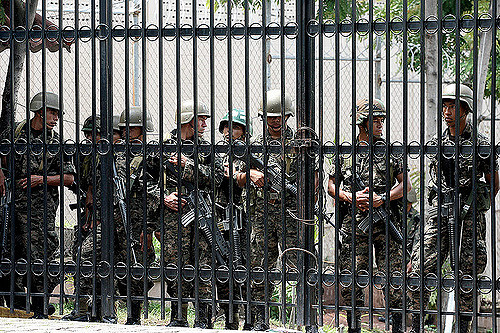Banana Republics: Made in the USA
| revcom.us
On Wednesday, former President George W. Bush condemned the attempt by Trump’s fascist mob to overturn the results of the 2020 election by saying, “This is how election results are disputed in a banana republic—not our democratic republic.” This is the same ex-president who, let’s remember, launched a war based on lies against Iraq, shattered its government and the broader society, and left a legacy of death, destruction, and instability in its wake.
Bush was just one of many politicians and pundits to make “banana republic” references. Everyone should condemn Trump’s attempted coup. But the use of the term “banana republic” in this way expresses disgusting imperialist arrogance and hypocrisy.
What does “banana republic” mean?
Banana republic is a term of insult and contempt, mainly used to describe poor oppressed countries that are wracked by political instability, where elections (if any) are often accompanied by widespread violence and whose governments often fall in coups before their legal term is up. As used by people like Bush, “banana republic” implies that “those people” are too primitive to run their own countries, unlike “civilized” people of the U.S. and Europe that conduct their affairs in an orderly way.
What causes a country to be a “banana republic”?
This term was first used in 1904 by the U.S. writer O. Henry to describe Honduras and neighboring Central American countries dominated by the United States. U.S. rule was enforced by coups and invasions that installed regimes that served U.S. interests. And the U.S.’s “interest” was in turning these countries, where people’s lives were based largely on agriculture, into giant plantations producing one or a few crops for export like coffee or bananas for corporations like United Fruit Company (now Chiquita Brands.) To do this, small-scale peasants—the majority of the population—were driven off their land and forced to work on these plantations for pennies a day. This resulted in enormous profits that were funneled into the coffers of these corporations and into the U.S. economy as a whole. The term for that is “superprofits”—rates of profit far beyond what could be squeezed out of working people in the “home” country.
U.S.-installed regimes in these countries enforced this plunder with cruel repression and terror. And in return, the U.S. protected these regimes, as long as they did the bidding of the American overlords, and enabled them to accumulate great wealth as well.
Not surprisingly, political rule under these conditions—countries run by a tiny sliver of gangsters whose “loyalty” is to foreign oppressors, while the great mass of people are repressed, terrorized, and desperately poor—are not “stable.” There is usually a lot of infighting among these rulers, often fueled by competing world powers trying to get or increase their “share” of the plunder. And there is powerful resistance and rebellion by the oppressed, which is often drowned in blood by the regime. But in the event that some leader or group with a program at odds with U.S. interests does come to power, then the U.S. “handles” it—with more coups or invasions.
U.S. troops invaded Honduras seven times between 1903 and 1925, a period known as “the banana wars.” In the 1980s, the U.S. trained, backed and financed a death squad that killed hundreds of labor leaders, students, religious activists, and others. In 2009, the Obama administration backed a military coup against the liberal-leaning populist president of Honduras.
Honduras’ neighbor, Guatemala, has suffered the same way. In 1952, the reformist Árbenz government instituted land reform and other policies that threatened the interests of United Fruit Company and that the U.S. thought smacked of “communism.” President Truman authorized a coup attempt in 1952 that failed. In 1954, his successor, President Eisenhower, authorized another coup, backed by the threat of U.S. invasion, that succeeded in installing a brutal regime that reversed the land reform. In the next few decades, hundreds of thousands of peasants were murdered by repressive Guatemalan regimes. In 1963 scheduled elections were canceled due to a military coup backed by the Kennedy administration.
A global chain of exploitation, oppression and domination—and what is to be done
The U.S. sits atop a parasitic food chain, the system of capitalism-imperialism, and there is tremendous wealth continuously extracted from oppressed countries around the world that the U.S. then mocks as “banana republics,” and along with the economic domination, there is continuing political domination. For more on this, go here and here. This chaining of billions of people to lives of endless toil, hunger, and fear is a crucial part of the economic basis for the “prosperity” of the U.S.: far from the horrific hunger or illness that characterizes most Third World countries. And this has also contributed to the foundation for the (limited) democratic rights and political stability, the peaceful transfer of power, and so on. Conversely, it is also the case that the political instability in these so-called “banana republics” is directly related to imperialist domination, to the desperately poor conditions of a vast section of its population.
This plunder is the source of the tremendous parasitism of U.S. society.1 The U.S. economy has for many decades been moving increasingly away from actually producing things and is now centered on the extraction, control, organization, circulation, sale, and consumption of things that are produced by “invisible” people in un-thought-about places. So if some countries are “banana republics,” then the U.S. is truly the “banana empire.”
And people who care about justice and the interests of humanity should think beyond a struggle to “keep the U.S. from becoming a banana republic” and instead imagine—and fight for—a world without “banana republics”... or banana empires either!
1. As Bob Avakian notes in a passage from Breakthroughs—The Historic Breakthrough by Marx, and Further Breakthrough with the New Communism, A Basic Summary which is quoted in Hope For Humanity On A Scientific Basis: Breaking with Individualism, Parasitism and American Chauvinism (see in particular the section “Parasitism, American Chauvinism, and Individualism”), the parasitism of American society refers to the fact that an increasingly globalized capitalism:
relies to a very great degree for production and for maintaining the rate of profit on a vast network of sweatshops, particularly in the Third World of Latin America, Africa, the Middle East and Asia, while capitalist activity in the capitalist-imperialist “home countries” is increasingly in the realm of finance and financial speculation, and the “high end” of (not the production of the basic physical materials for) high tech, as well as the service sector and the commercial sphere (including the growing role of online marketing). As Lenin phrased it, this puts “the seal of parasitism” on the whole of societies such as the U.S. [back]
Now Available:
Hope For Humanity
On A Scientific Basis
Breaking with Individualism,
Parasitism and
American Chauvinism
Bob Avakian
Author of
The New Communism
Get a free email subscription to revcom.us:





